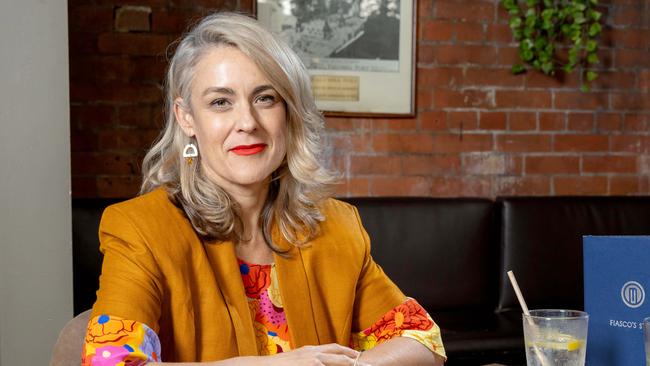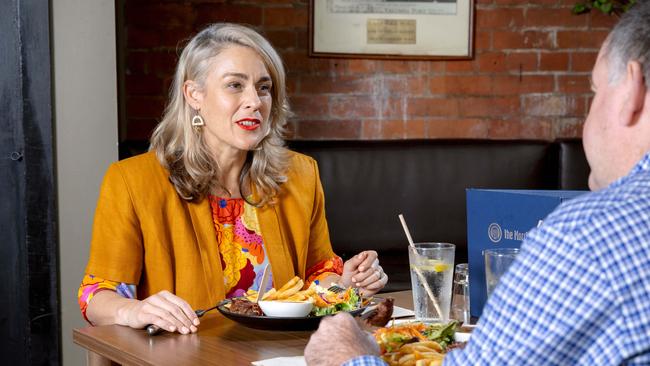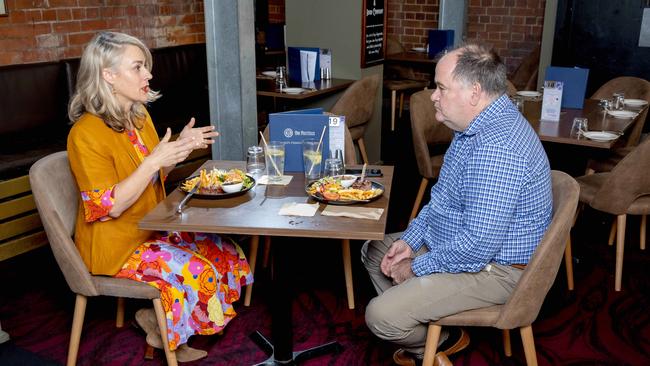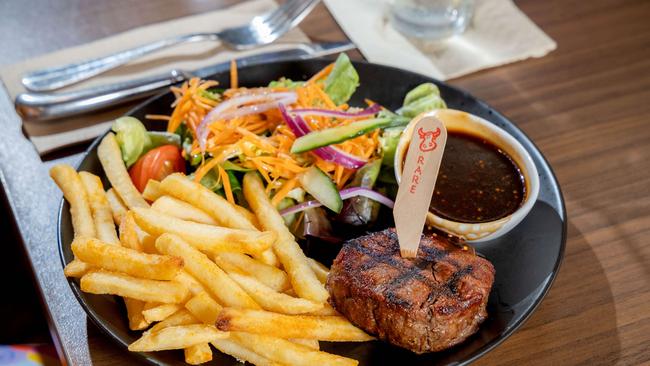
Juvenile crime is the key issue in next month’s state election but Queensland Council of Social Service CEO Aimee McVeigh is not a fan of either major party’s approach. WELCOME TO HIGH STEAKS
They are the little gremlins scurrying about inside Queensland’s collective subconscious – those angry little imps you dread when you hear a bang in the lounge room at 2am.
It’s often just the Netflix-start up sound reminding you that someone left the television on.
But in the minds of many Queenslanders, any midnight disturbance now heralds the arrival of a drug-addled juvenile hellbent on taking not only your car, but your life.
Juvenile crime is the key issue in the looming October poll, it’s the prime policy focus of both the Opposition and the ruling Labor Party, it’s flooding some children’s courts with upwards of 1000 cases a day and it’s driven some communities, such as Townsville, into a state of fury and despair.
“Lock them up and lose the key,’’ is still a common cry from an electorate at wits end about how to get kids out of our homes and off our streets, and angry calls for retributive justice become perfectly understandable once you’ve experienced a violent home invasion.
The huge majority of Queensland adults, especially the more senior ones among us, have serious issues with juvenile crims, possibly because we once read the “Midwich Cuckoos’’ and came to appreciate how spooky kids can get.

Many of us (perhaps men in particular) would prefer to deal with a full-grown adult invading their home than having to confront a diminutive 13-year-old psychopath.
Their behaviour can be utterly unpredictable, and their size makes it seem almost dishonourable to hit them, even in self-defence. The almost instinctive response to an angry urchin materialising in your kitchen is: “Where on Earth are your parents?’’
In almost all cases, you don’t really want to know the answer to that question.
Aimee McVeigh, CEO of the Queensland Council of Social Service, does.
And even with her deep appreciation of the gritty reality of many of these kids’ lives she still sees pathways to their redemption – a positive alternative to this “Lord of the Flies’’ chaos we fear is enveloping the state.
The lawyer and human rights advocate, once appointed United Nations Special Rapporteur on the rights of Indigenous peoples as a gender adviser, now heads an organisation that represents the largest employer in the state – the community services sector.
Hundreds of thousands of people, including an army of volunteers, look to QCOSS as the peak body supporting their work in homelessness, domestic violence, assisting people with disability and mental health issues and working with kids caught up in the justice system
McVeigh is not only charming but very funny, which is perhaps the biggest surprise given the sometimes grim nature of her work.
She’s smiling broadly even as she sits down to order an Eye Fillet at Fiasco’s Steakhouse at the historic Morrison Hotel in Brisbane’s West End, putting her good humour down to the fact that she’s about to get a free lunch.
“I don’t often get to have a nice lunch like this in my job,’’ she says gazing around a pub which has survived a century of inner city development, and has kept more than a whiff of 19th Century gentility with its stained glass and wood panelling.
She’s acutely conscious she’s not going to receive a round of applause for her work, even if her empathy for these orphans (because, to all intents and purposes, that is what many of them are) is leavened with a hard-headed appreciation of stark practicalities.
Some juvenile criminals, she says, simply have to be locked up.
“Where there is a significant threat to our safety as a community than governments must have laws and policies in place to protect us.’’
On the other hand, she reasons, we don’t really need any protection from that frightened 10-year-old found in the back of a stolen car.
“We need to make sure that that kid is connected back into their families and their communities, and then work out what is going on, why is that kid out on the street?’’ McVeigh says.

“Because if we don’t do that, that 10-year-old will end up being that 16-year-old causing the very problems that we all want solved.’’
If you want to argue with her, by all means do. But just be aware she has a Master of Laws (International and Public Law) from the University of Melbourne and can prosecute her case with a logical consistency not reliant on emotion.
If we want kids to commit more crimes, the path certain to produce that outcome is to increase rates of incarceration, she says.
If we want to bring the crime rate down, keeping them out of “juvie’’ detention as much as possible is equally certain to produce the desired result.
She is dismissive of both major parties when it comes to juvenile crime, declaring both Opposition Leader David Crisafulli and Premier Steven Miles are using a serious social issue to promote a public perception of their own manliness.
“When it comes to youth justice, I think they are a pair of wannabe macho men,’’ she says.
“They want to convince the community they’ve got big muscles in the gym
“I think it applies to both of them – flexing their muscles and showing us all our tough they are.’’
Yet she’s always ready to listen to the “lock ’em up and throw away the key’’ crowd.
“People who have different views?
“Well I want to hear all those, I think things need to be understood.’’
She was recently in Townsville, one of the worst-hit areas in the state when it comes to juvenile crime, taking part in a public forum when a well-spoken and clearly well-educated woman noted the age of criminal responsibility was 10 years old.
“She said, but I have a 10-year-old,’’ McVeigh recalls.
“And then, within a few seconds, something shifted in her brain and she said, but those 10-year-olds are different to my 10-year-old.’’
That, to McVeigh, was an illuminating moment, crystallising the attitudes of many Queenslanders.
The “othering’’ of the juvenile offender – of allocating them entirely different characteristics from the norm – is a way of justifying all sorts of excessive punishments, she believes.
She also understands how her own philosophy can be challenged when harsh reality intrudes.
Recently a friend of hers lost her husband, leaving the deeply bereaved woman alone in the family home learning how to be a single mum.
A group of young people got into the house one night, traumatising the entire grieving family.
“It was terrifying, it was a violation, she (her friend) was really angry at those children,’’ McVeigh says.

“And I understand that, it is a normal human reaction.’’
The primary purpose of her work, she says, perhaps anticipating the attacks of her detractors, is to help solve the problem of juvenile crime, and ensure that sort of trauma doesn’t visit itself on another family.
Meals finished, we agree Fiasco’s is a fine place to spend an afternoon.
The service is great, the food superb, and the hotel itself a hidden gem, a throwback to an age when the pub was the centre of family and social life.
We call it a nine out of 10.

Add your comment to this story
To join the conversation, please log in. Don't have an account? Register
Join the conversation, you are commenting as Logout
Woman’s body found on busy Brisbane bikeway
A woman’s body has been found on a busy bikeway in Brisbane’s north on Monday morning.
‘Wettest period of the season’: Parts of Qld told to brace for heavy rain, flooding
Heavy rainfall that could lead to flooding is expected for much of Queensland over the coming week, with several flood watches and warnings issued in anticipation of the weather event.